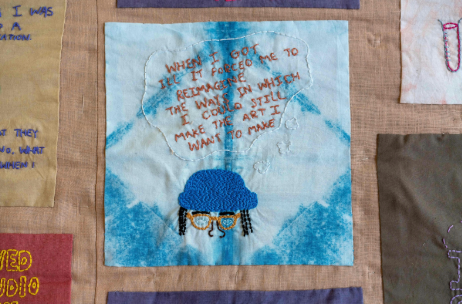Updates
UNFPA at the Global Disability Summit 2025: Championing rights, health and inclusion with art and action
02 May 2025
Updates
02 May 2025
BERLIN, Germany – Around the world, persons with disabilities – particularly women and young people – continue to face intersecting barriers to accessing essential services, including sexual and reproductive health. The third Global Disability Summit, co-hosted by the Government of Germany, the Government of Jordan, and the International Disability Alliance (IDA), provided a critical platform to mobilize action and renew global commitments to the rights and inclusion of persons with disabilities.
At this year’s Summit in Berlin, UNFPA, the United Nations sexual and reproductive health agency, reaffirmed its commitment to advancing the rights, inclusion and agency of persons with disabilities. UNFPA hosted an art exhibition featuring powerful works by artists with disabilities, alongside documentary photography capturing the lived experiences of persons with disabilities.
Art as a vehicle against discrimination
“Wanted: A World for One Billion” serves as a creative advocacy space that celebrates diverse talents while spotlighting the importance of access, dignity and empowerment. Through the artists’ visions and expressions, UNFPA makes a clear statement against ableism, sexism, racism and other forms of discrimination, and amplifies its call for the inclusion of persons with disabilities in sexual and reproductive health and rights policies and programmes, including in crisis-affected contexts.
The exhibition brings together artists from diverse horizons, like Jamila, who uses her practice as “grief work”, informed by her lived experience of disability, mixed race ancestry and the loss of her father at a young age.

Shahrzad Darafsheh, another featured artist, had to deal with endometriosis, followed by cancer and hysterectomy. She uses art as a path towards acceptance. “This is the project of my journey through a sickness.”

A collective commitment
At the Summit, UNFPA welcomed the “Amman-Berlin Declaration on Global Disability Inclusion,” which strengthens international cooperation on disability rights and reaffirms the global community’s pledge to implement the Convention on the Rights of Persons with Disabilities (CRPD). It also endorsed the call to action “Making health equity for persons with disabilities a priority at the 2025 Global Disability Summit,” highlighting the urgent need to remove barriers to health access, and to build resilient, inclusive health systems that serve all.
In addition, UNFPA endorsed the call to action “Empowering Women with Disabilities in Leadership and decision-making” developed by the Global Forum on the Leadership of Women with Disabilities (GFLWD).
UNFPA continues to scale up initiatives that ensure persons with disabilities are empowered to make decisions regarding their sexual and reproductive health and rights, including through We Decide. The programme’s main supporter, the Government of Spain, lauded the successful collaboration in Berlin and beyond: “At the 2025 Global Disability Summit, we saw the real power of international cooperation in action,” said Antón Leis García, the Director of the Spanish Agency for International Development Cooperation (AECID).
“Spain is proud to support the We Decide programme, which is making a real difference in promoting the sexual and reproductive health and rights of women and young people with disabilities. We applaud UNFPA for its tireless work to break down barriers and create more choices for everyone. Spain stands strongly committed to continuing our collaboration to make inclusion, equality and autonomy central to global development,” he added.
Germany commits to inclusion
As the co-host of the Global Disability Summit 2025, the Government of Germany showed strong commitment to the goal of inclusion: “Inclusion is not just a desirable ideal, it is a fundamental human right. When we succeed in securing the full participation of persons with disabilities as well as their access to sexual and reproductive health and rights and protection from gender-based violence, our societies as a whole will benefit. Inclusion makes all of us richer – in social but also in economic terms,” said Svenja Schulze, Federal Minister for Economic Cooperation and Development from Germany. “At the third Global Disability Summit in Berlin, we have delivered on real improvements for the 1.3 billion people with disabilities worldwide.”
UNFPA is scaling up its work on disability inclusion. With strong political will and renewed global attention, we see a pivotal opportunity to deepen our impact, especially in promoting inclusive sexual and reproductive health and rights, and ensuring women and youth with disabilities are leaders in shaping their futures. UNFPA calls on donors to match this momentum with sustained and flexible funding to transform commitments into lasting, transformational change for persons with disabilities.
Facts and Figures